Trees A - L
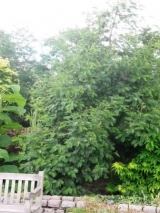 Acacia dealbata
Acacia dealbata
In the walled garden by the Moat wall in the rockery
Alder
Alnus incana
In the north west end of the woodland glen
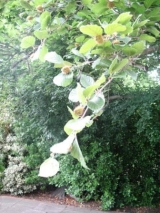 Fagus sylvatica
Fagus sylvatica
The beech is on the western side of Moat Island. The stump remains in the south western corner of Moat Island of a huge beech cut down a few years ago when it was decided it was unsafe.
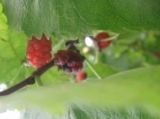 Morus nigra
Morus nigra
There are two mulberry trees in the Pleasaunce; one black and one white. Only the black, in the woodland area behind the Tudor Barn, is bearing berries this year. They can be told apart by the shape of their leaves.
There are now pictures of 40 species in this website's TREE SECTION. Also, you can print off a TREE TRAIL
AND MAP for your next visit to the Pleasaunce.
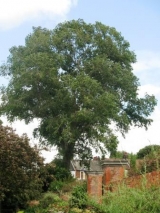 The black poplar situated at the entrance to the Italian garden is the Pleasaunce's tallest tree, at around 104 feet. From measuring its girth (187 inches), it suggests it is probably between 120 and 180 years old.
The black poplar situated at the entrance to the Italian garden is the Pleasaunce's tallest tree, at around 104 feet. From measuring its girth (187 inches), it suggests it is probably between 120 and 180 years old.
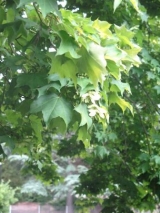 Acer cappadocicum
Acer cappadocicum
To be found in the woodland glen by the Moat, towards the entrance to the walled garden
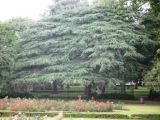 Cedrus libani
Cedrus libani
At the entrance to the walled garden from the Co-op entrance. One of the oldest trees in the Pleasaunce, featuring at its full height in the 1920s pictures of E Nesbit's Well Hall House. Its twin, which was to the north, blew down in the storms of 1988.
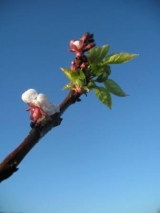 Prunus
Prunus
By Kidbrooke Lane and in the walled garden
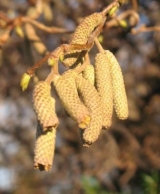 Two trees in the woodland glen
Two trees in the woodland glen
The mass of golden catkins in early spring is the hallmark of the corkscrew hazel, a substantial example of which peeps over the north hedge of the bowling green. It has contorted, twisted stems and branches and is well-known for its presence in flower displays,
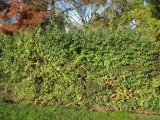 The Pleasaunce's only elm is found at the far end of the hedgerow between the putting green and the woodland glen. Most elms in this country were killed by Dutch Elm Disease in the 1970s and 80s; some survive, such as this one, but would succumb if allowed to grow to any height.
The Pleasaunce's only elm is found at the far end of the hedgerow between the putting green and the woodland glen. Most elms in this country were killed by Dutch Elm Disease in the 1970s and 80s; some survive, such as this one, but would succumb if allowed to grow to any height.
|
| Last Updated: 2nd-Jul-2007 01:10 |
 Print Print |
|
|
|
|
|
|
Subscribe to newsletter
|
 |
|
|
|
|
|
|